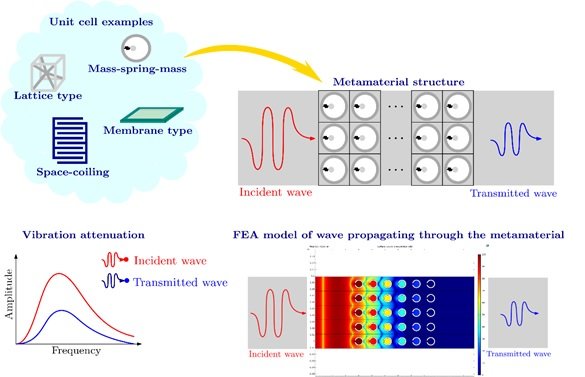Design optimization and prototyping of large-scale metamaterial structures for vibration control
Problem Domain
Metamaterials are artificially architected structures designed to achieve a set of properties not found in nature, such as negative refractive indices, negative mass density and bulk modulus, asymmetric transmission and programmable modulation of the phase and amplitude of the incident wave. The internal structure of the metamaterials is defined by unit cells whose dimensions are generally much smaller than the smallest wavelength from the domain. Some examples of functionalities obtained by such materials are invisibility cloaking, super-resolution imaging, vibration attenuation and energy harvesting. The use of such unique materials in the large-scale domain has not been extensively explored, especially scalability of metamaterials and large-scale manufacturing.
Design of metamaterial structure for vibration attenuation
Objective
This project aims to design and prototype a large-scale metamaterial structure for vibration attenuation. One application of interest is to mitigate the noise from the pile driving process in offshore environment.
Such process results in the transmission of high noise levels that can cause harm to the marine life.
Approach
The first step in this project is to identify the range of frequencies responsible for generating the noise during the pile driving process. Therefore, an investigation into the hammer-pile-soil-water system is performed by using computational tools. The obtained frequencies are used as input design parameters for the metamaterial structure. Since such frequencies depend on the features of the system, tailoring of the constitutive parameters of the metamaterial structure is required. One strategy to design a metamaterial is using an inverse design process, which starts with the definition of the desired properties and results with an optimal geometry. After numerically validating the proposed structure, the final step is prototyping and executing an experimental verification of the design.
Funding
Faculty of Mechanical Engineering, TU Delft.
Contact
PhD Candidate: Ana Carolina Azevedo Vasconcelos
E-mail: A.C.AzevedoVasconcelos@tudelft.nl
Supervisor(s): Dr. Jovana Jovanova – Department Maritime and Transport Technology – Section Transport Engineering and Logistics
